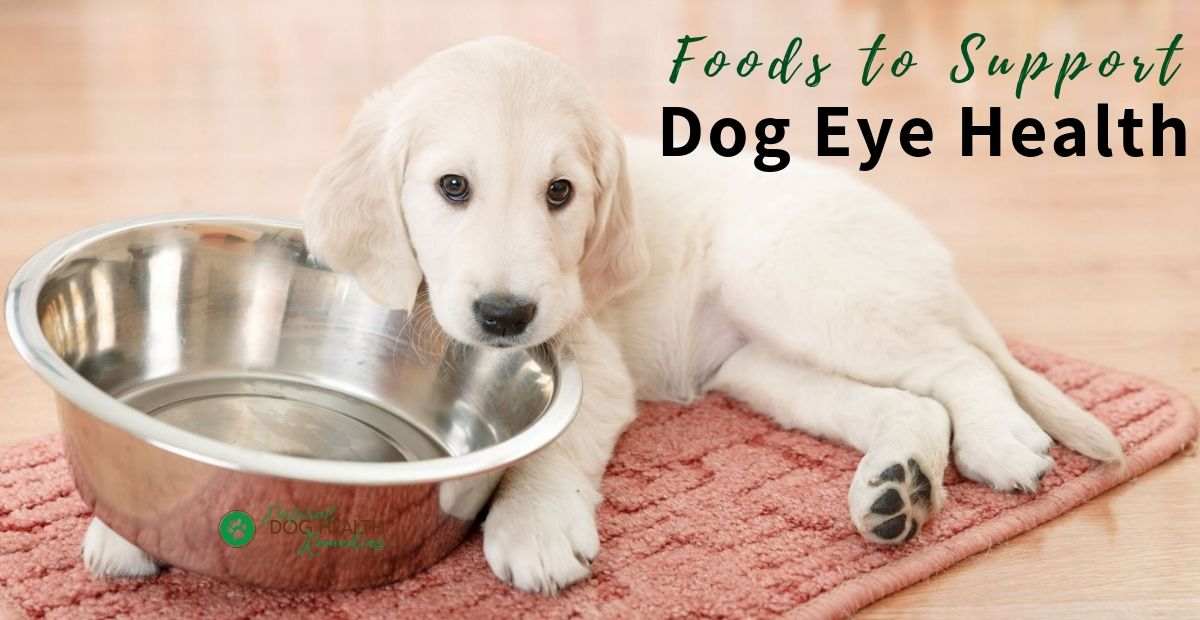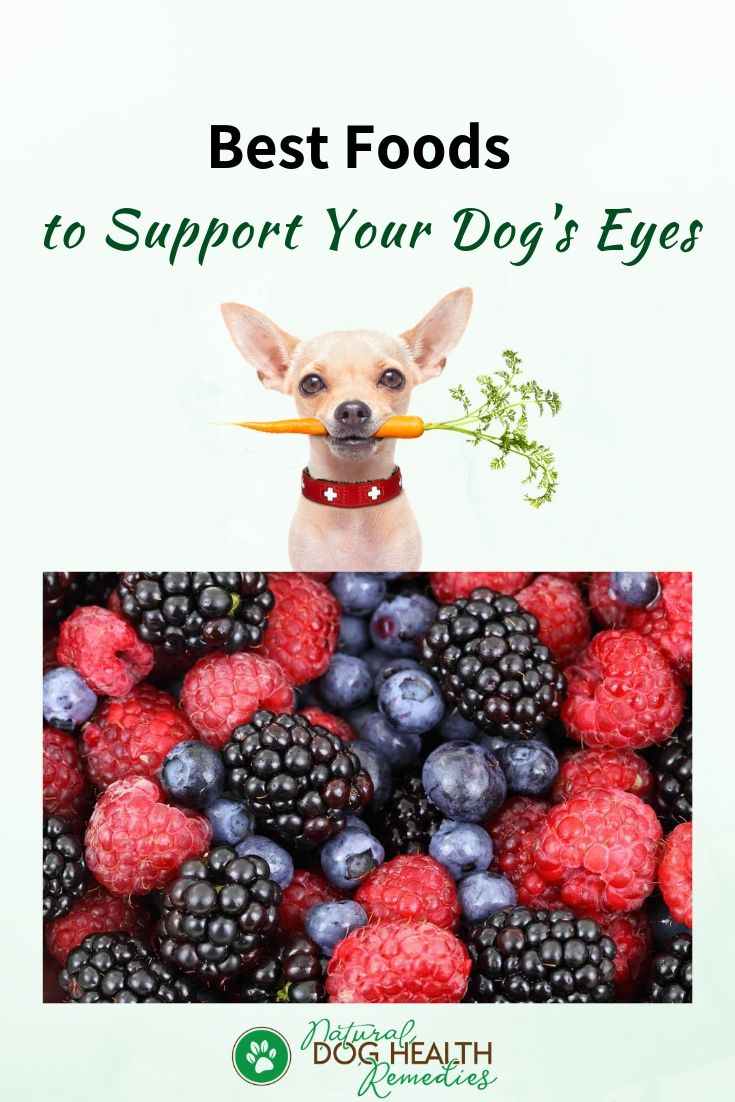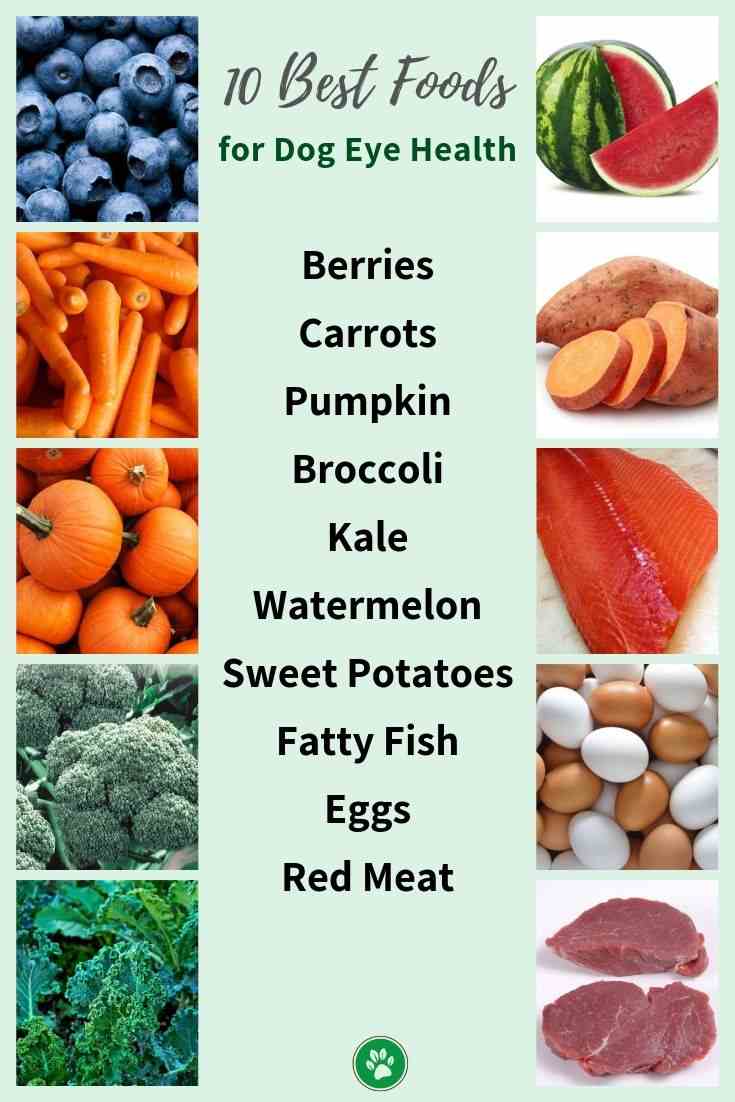Foods for Dog Eye Health

Overview
Like us, dogs are susceptible to various forms of eye problems, from scratches to the cornea, inflammations and infections, to something more serious such as glaucoma.
As dogs age, they are likely to develop age-related eye problems, like macular degeneration, nuclear sclerosis, and cataracts.
In addition, eyes are more susceptible to oxidative damage because they are exposed to light most of the time. Free radical damage can also occur during the process of metabolism. Since the eye has a very high metabolic rate, it needs the help of as many antioxidants as possible!
While we cannot totally prevent eye problems from developing in our dogs, we can use foods and supplements to help support and maintain their eye health.
This article looks at the nutrients that are essential for dog eye health, and the foods that are rich in such nutrients that are safe for dogs to consume. Later on in the article, I also suggest different ways to incorporate such foods in a dog's diet.
Do All Dogs Need Eye-Supporting Foods?
You may wonder if you need to give your dog specific foods to enhance his eye health, since he is already on a premium diet.
The truth is, according to a study1, even dogs on "premium diets" could benefit from eye-supporting foods and supplements that support eye health (e.g. lutein, zeaxanthin).
Eye Supporting Nutrients and Foods for Dogs
Nutrients that support eye health include antioxidants, such as carotenoids (lutein, zeaxanthin, beta-carotene), anthocyanins, lycopene, glutathione, vitamins C and E, and the minerals selenium and zinc2. Also, it has been found that Omega-3 fatty acids, with their anti-inflammatory properties, may lessen the risk for age-related eye disease3.
Let's take a look at these nutrients that are responsible for eye health:
Anthocyanins
Anthocyanins are the pigments that give some fruits and vegetables their deep red and purple colors.
They are found to be powerful antioxidants and anti-inflammatories, and are important nutrients in supporting and maintaining good eye health and vision4. In particular, they can help prevent and slow the progression of macular degeneration and reduce eye fatigue.
Foods that are rich in anthocyanins and safe for dogs include berries (blueberries, blackberries, cranberries) and sweet potatoes.
Lutein and Zeaxanthin
 These two carotenoids are often referred to as "macular pigment" because they are found in the macula (central region of the retina) and are powerful antioxidants that improve pigment density in the macula. This pigment protects cells in the macula by absorbing excess UV light and neutralizing free radicals. That's why they are also sometimes called "natural sunblock for the eye".
These two carotenoids are often referred to as "macular pigment" because they are found in the macula (central region of the retina) and are powerful antioxidants that improve pigment density in the macula. This pigment protects cells in the macula by absorbing excess UV light and neutralizing free radicals. That's why they are also sometimes called "natural sunblock for the eye".
Foods that are rich in lutein and zeaxanthin and are safe for dogs include kale, broccoli, spinach, pumpkin, blueberries, and eggs.
Beta-carotene
Beta-carotene belongs to a class of carotenoids. It's an orange pigment found in some fruits and vegetables.
Beta-carotene helps reduce the risk of macular degeneration and generally supports eye health.
Some dog-friendly foods rich in beta-carotene include carrots, pumpkin, broccoli, kale, spinach, cantaloupe, and sweet potatoes.
Glutathione
Glutathione is a natural antioxidant produced in all living cells. It exists in high concentrations in the lens and is responsible for maintaining lens transparency. The bad news is, glutathione levels decrease in the lens as we (and dogs) age.
Glutathione is essential in preventing and slowing cataract formation, and may also help patients with glaucoma by maintaining enough fluid outflow and detoxifying the aqueous fluid of the inner eye.
Dog-friendly foods rich in glutathione include eggs, apples, bananas, watermelon, broccoli and garlic (Large amounts of garlic fed to dogs on a regular basis is not recommended, but small amounts can be fed - see this article for more information.)
Lycopene
Lycopene is a plant pigment that gives some fruits their red and pink colors. It is an antioxidant that gives protection against the sun, and also reduces the risk of free radical damage, macular degeneration and cataracts.
Foods rich in lycopene and safe for dogs include tomatoes (ripe ones), watermelon, papaya, and carrots.
Zinc
Zinc is an antioxidant that is important in supporting and maintaining retinal health. It can prevent the progression of macular degeneration and generally support vision.
Foods rich in zinc and can be given to dogs include beef, turkey and chicken (dark meat), cheddar cheese, and yogurt.
Selenium
Selenium itself is an antioxidant, but it also has the added benefit of potentially increasing the effectiveness of vitamin E, another antioxidant important for eye health.
More importantly, it promotes the production of glutathione - the all-important antioxidant for the eye as mentioned above.
Oats, beef, poultry, eggs and cheese are rich sources of selenium and can be given to dogs.
Omega-3 Fatty Acids
Omega-3 fatty acids are important antioxidants and anti-inflammatories that are important for maintaining retinal health. It helps in the prevention of macular degeneration.
Fatty fish such as salmon, tuna, and sardines are rich in Omega-3 fatty acids and can be fed to dogs. Flaxseed and flaxseed oil are also good sources of Omega-3 fatty acids.
Vitamins C and E
Vitamins C and E are also powerful antioxidants good for the eye.
Foods that can be given to dogs and are rich in vitamins C and/or E include carrots, broccoli, apples, tomatoes, watermelon, spinach, and peanut butter.
Best Foods for Dog Eye Health
Here is a summary of some of the best foods that you can feed your dog to help support and maintain his eye health.
| Food | Nutrients |
| Berries (blueberries, blackberries, cranberries) | Anthocyanines, lutein, zeaxanthin |
| Carrots | Beta-carotene, lutein, lycopene, anthocyanins, vitamins C & E |
| Pumpkin | Beta-carotene, lutein, zeaxanthin |
| Broccoli | Lutein, zeaxanthin, beta-carotene, glutathione, vitamins C & E |
| Kale/Spinach | Lutein, zeaxanthin, beta-carotene |
| Watermelon/Tomatoes | Lycopene, glutathione, vitamin C |
| Sweet Potatoes | Beta-carotene, anthocyanins |
| Fatty Fish | Omega-3 fatty acids, selenium |
| Eggs | Lutein, zeaxanthin, glutathione |
| Red meat (beef, turkey/chicken dark meat) | Zinc |
Ways to Feed Eye-Healthy Foods to Dogs
 There are many ways to incorporate some of the above eye-healthy foods into your dog's diet, whether you home cook for your dog or not.
There are many ways to incorporate some of the above eye-healthy foods into your dog's diet, whether you home cook for your dog or not.
For example, some fruits and vegetables can be given as treats to your dogs. Blueberries and yogurt provide a great source of antioxidants and zinc. Simply add some fresh blueberries to a couple tablespoons of plain unsweetened yogurt and you can give it to your dog to enjoy.
Or, how about serving your dog some delish fruit cocktail? Simply cut up some watermelon, cantaloupe, papaya and apple into bite-size pieces and give them to your dog as a super-healthy treat!
Pure pumpkin puree can be added to your dog's food as a "topper".
Occasionally, give your dog a couple of raw carrot sticks (smeared with unsweetened peanut butter) to chomp on. Yum!
If you want to give your dog vegetables such as broccoli or kale, it's best to lightly steam the veggies, or puree them.
I also like to make kale chips (as I find that some dogs are not too crazy about steamed or pureed kale.) All you need to do is wash the leaves, dry them and tear them up into smaller bite-size pieces. Put them in a bowl and drizzle 1-2 tablespoons of coconut oil. (The coconut flavor makes the vegetable more palatable for dogs.) Toss thoroughly to mix and spread the kale on a baking sheet and bake in a preheated oven (225°F or 107°C) for 15 minutes or so. That's it!
You can also make a tuna omelette for your dog. Just open up a can of tuna, drain the water, and dump the fish into a bowl. Add 2 eggs, some finely chopped broccoli and a pinch of turmeric. (Turmeric can improve the activity of glutathione.) Mix well and use the mixture to make a yummy eye-healthy omelette for your dog. (You can divide the omelette into smaller portions depending on your dog's size.)
As you can see, there are many ways to add eye-healthy foods to your dog's diet. The sky's the limit!
Other Ways to Keep Your Dog's Eyes Healthy
In addition to feeding your dog the above foods, here are some additional things that you can do to further support the health of your dog's eyes:
- Protect your dog's eyes from UV light and debris by having them wear "dog goggles", such as these QUMY Dog Goggles
(Affiliate link).
- Avoid staying outside for too long when UV rays are the strongest (between 10 am and 4 pm).
- Make sure your dog has regular exercise - Eyes need good blood circulation because they need oxygen!
- Also make sure that your dog has sufficient restful sleep. Sleep deprivation can deplete glutathione levels.
- Encourage your dog to drink enough water. Dehydration can result in a lack of tear production, which in turn can lead to dry eye.
1. Antioxidant supplementation increases retinal responses and decreases refractive error changes in dogs
2. Top foods to help protect your vision
3. Nutrients for the aging eye
4. Anthocyanidins and anthocyanins: colored pigments as food, pharmaceutical ingredients, and the potential health benefits





